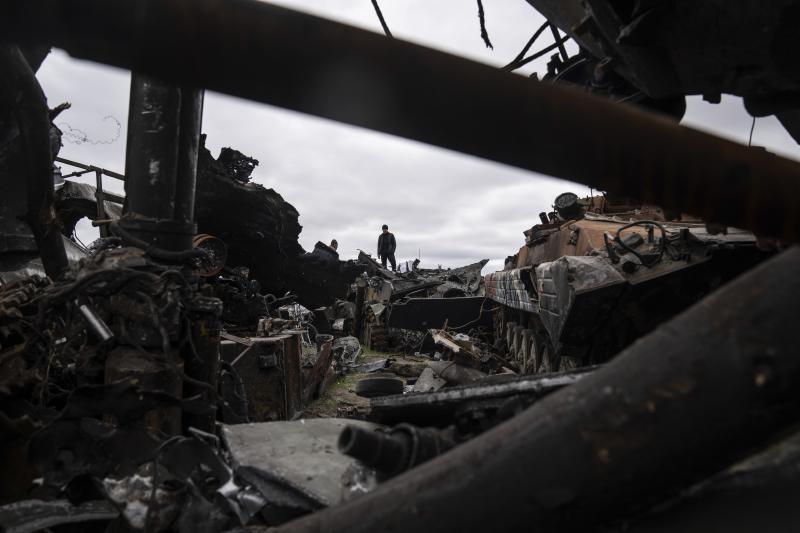
A local man stands atop of destroyed Russian armoured vehicles in Bucha, Ukraine, on Tuesday.
12:40 JST, April 20, 2022
As governments and social media companies have moved to suppress Russia’s state media and the disinformation it spreads about the war in Ukraine, the Kremlin’s diplomats are stepping up to do the dirty work.
Russian embassies and consulates around the world are prolifically using Facebook, Twitter and other platforms to deflect blame for atrocities while seeking to undermine the international coalition supporting Ukraine.
Tech companies have responded by adding more labels to Russia’s diplomatic accounts and by removing the accounts from its recommendations and search results. But the accounts are still active and are disseminating disinformation and propaganda in nearly every nation, in part because their diplomatic status gives them an added layer of protection from moderation.
With hundreds of social media accounts on every continent, Russia’s diplomatic corps acts as a global network for propaganda, in which the same claims can be recycled and tweaked for different audiences in different nations. And, so far, steps to substantially curtail that effort have fallen short.
Each week since the beginning of the war these diplomats have posted thousands of times, gaining more than a million engagements on Twitter per week, said Marcel Schliebs, a disinformation researcher at the Oxford Internet Institute at Oxford University. He has tracked more than 300 social media accounts linked to Russian embassies, consulates and diplomatic groups.
Some Russian embassies, like ones in the U.K. and Mexico, for example, are especially active, churning out pro-Russian propaganda and spreading falsehoods intended to support the invasion.
The Russian missile attack on a Ukrainian rail station that killed 50? Ukrainians were behind it, the Russian Embassy in the U.K. tweeted. Talk of Russian war crimes? It’s a plot by Britain to make Russia look bad, the embassy claimed. Those Ukrainian soldiers fighting for their country? They’re actually Nazis operating under U.S. orders, the embassy alleged.
The Russian Embassy in London tweeted out those and other conspiracy theories all on one day last week. Each post received hundreds or thousands of retweets, comments and likes, including dozens from other Twitter users pushing back on the propaganda.
They must know better, but that’s what it’s like living in and working for a totalitarian regime, said Nicholas Cull, a University of Southern California professor who studies the intersection of diplomacy and propaganda. “A totalitarian regime requires a media bubble. It requires censorship at home, and it requires your own messaging, both for a domestic and foreign audience. That’s what this is.”
As representatives of their countries empowered to speak on their behalf, diplomats have always been known for pushing their nation’s talking points. Russian diplomats in particular have long been known for spreading the Kremlin’s disinformation. Russian diplomats used social media to spread disinformation about the invasion of Crimea in 2014 and about the poisoning of Russian dissidents.
Their status as representatives of a foreign government has often given them the freedom to speak.
Sometimes they even try to rewrite history, as they did in 2019, when Russian diplomatic accounts used the hashtag #TruthaboutWWII to distort the Soviet Union’s initial non-aggression pact with Nazi Germany. That disinformation campaign was revealed by researchers at the Atlantic Council’s Digital Forensic Research Lab, which determined that Russian diplomats play a pivotal role, along with state media and social media bots, in the country’s sophisticated disinformation apparatus.
The Kremlin tends to employ a full spectrum model of propaganda, the Atlantic Council researchers concluded.
Since the start of Russia’s invasion of Ukraine, tech companies and even governments have taken other actions to stop the flow of disinformation coming from Russia’s state-controlled media. The European Union banned outlets like RT and Sputnik. Meta barred those outlets from platforms it owns, including Facebook and Instagram. Tech companies also cut off the outlets from ad revenue and expanded efforts to label their accounts.
A message seeking comment from the Russian Embassy in the U.S. was not immediately returned.
A noticeable increase in pro-Russian propaganda regarding Ukraine began in the weeks and months before the invasion even began in February.
The accounts were tweeting about 2,000 times per week immediately after the invasion, resulting in more than 1 million likes, retweets and comments, according to Schliebs’ research.
That engagement fell after Twitter announced earlier this month that it would no longer promote more than 300 Russian accounts or include them in search results, a technical move known as “demotion,” designed to limit the accounts’ reach. Yet despite Twitter’s action, the accounts Schliebs monitored are still earning about half a million likes, retweets and comments per week.
Twitter and Facebook have added “Russian government organization” labels to many of these accounts to ensure users know the source of the information. But Schliebs found many accounts still have no labels: Of the 300 or so accounts he’s looked at, only about a third have a label.
A Twitter spokeswoman said the company has already labeled 260,000 Tweets from Russian accounts since Feb. 28 and is continuing to add labels to accounts “on a rolling basis.”
Schliebs compared the response by tech companies to Russia’s invasion with their actions following the 2020 U.S. election, the Jan. 6, 2021, attack on the U.S. Capitol and the COVID-19 pandemic. Then-President Donald Trump was kicked off Twitter for inciting violence ahead of the Jan. 6 riot. But the Russian diplomats — they have spread wild conspiracy theories and blamed Ukrainians for Russian atrocities — stay on.
By no means am I defending him (Trump), but I fail to see the consistency in that policy, he said.
Meta has implemented similar changes designed to label Russian diplomatic accounts and reduce their reach on its platforms.
Last month, the company also removed a post spread by Russian diplomats that suggested its deadly air strike on a children’s hospital in Mariupol was a hoax.
Schliebs said there is a danger in platforms like Facebook and Twitter coming down too hard on the diplomatic accounts. For one, it could worsen Russia’s antagonism toward U.S.-based tech companies. (Facebook, for instance, has been labeled an “extremist” organization.) But it could also force Russia and its supporters onto less transparent platforms like Telegram, where researchers and regulators can’t see what they’re saying.
It’s a shift that Russia’s diplomats are preparing for, as the Russian Embassy in the U.K. tweeted last week.
Meet our DiploFamily on @telegram, it wrote.
Top Articles in News Services
-

Arctic Sees Unprecedented Heat as Climate Impacts Cascade
-

Prudential Life Expected to Face Inspection over Fraud
-

South Korea Prosecutor Seeks Death Penalty for Ex-President Yoon over Martial Law (Update)
-

Trump Names Former Federal Reserve Governor Warsh as the Next Fed Chair, Replacing Powell
-

Japan’s Nagasaki, Okinawa Make N.Y. Times’ 52 Places to Go in 2026
JN ACCESS RANKING
-

Univ. in Japan, Tokyo-Based Startup to Develop Satellite for Disaster Prevention Measures, Bears
-

JAL, ANA Cancel Flights During 3-day Holiday Weekend due to Blizzard
-

China Confirmed to Be Operating Drilling Vessel Near Japan-China Median Line
-

China Eyes Rare Earth Foothold in Malaysia to Maintain Dominance, Counter Japan, U.S.
-

Japan Institute to Use Domestic Commercial Optical Lattice Clock to Set Japan Standard Time


























